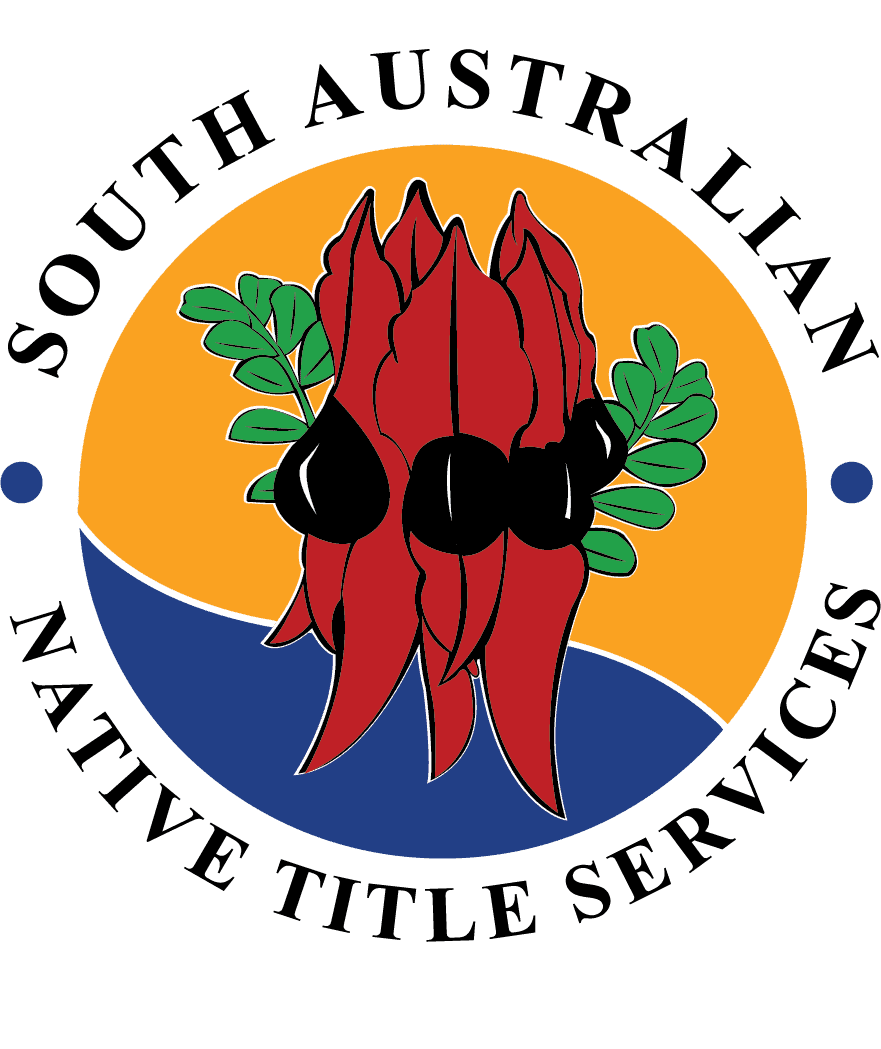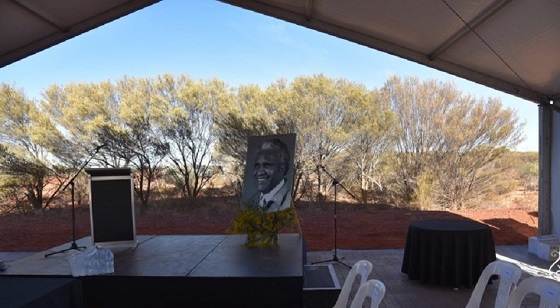Yunkunytjatjara leader and anti-nuclear campaigner Yami Lester OAM has been farewelled at a state funeral held on his traditional lands at Walatina Station in the Anangu Pitjantjatjara Yankunytjatjara (APY) lands in northern South Australia.
Over 400 people paid their respects to a man celebrated as a survivor and advocate for the victims of nuclear testing, staunch land rights campaigner and interpreter and champion for Anangu.
Family, friends, colleagues, community members and state and federal politicans gathered a stone’s throw from Walkinytanju Creek, where Mr Lester was born 75 years ago. Dignitaries attending included The Governor Mr Hieu Van Le, Premier Jay Weatherill, Minister for Indigenous Affairs Nigel Scullion, Minister for Aboriginal Affairs Kyam Maher and Opposition Leader Steven Marshall.
The Premier said they were gathered to farewell a remarkable citizen of the state.
“Yami Lester was a man of compassion, resilience and warmth. He was dedicated to improving people’s lives and to righting wrongs.”
“By his actions over many decades he has helped us understand the Aboriginal cultures that have enriched this land for tens of thousands of years.”
Mr Weatherill reminded mourners how Mr Lester witnessed the “horror” of British Government nuclear testing at Emu Fields in 1953 and became blind from the effects of those tests as a young man. The Premier recounted Mr Lester’s later account of the tests.
“I heard a big bang, a noise like an explosion and later something came in the air. It was coming from the South with black like smoke. I was thinking it might be a dust storm, but it was quiet, just moving, through the trees and above that. It was just rolling and moving quietly,” Mr Lester had described.
For decades Mr Lester kept on speaking up about what had happened to his people, resisting government denial of the impact of the tests.
“In 1982 Yami heard the Chair of the Safety Committee for Emu Fields speak on radio. That man told the listeners that no Aboriginal people had been harmed by any of the tests, in fact they’d all been well looked after,” the Premier said.
Mr Lester was angry to hear this and immediately set about raising awareness of the true impact of the tests on Anangu. That work led to the McClelland Royal Commission, which recommended a clean-up operation to restore the country and group compensation.
Those present at Walatina were reminded that Mr Lester was concerned with the welfare of Aboriginal people throughout his life. As a young man he was a welfare worker and interpreter with the Aboriginal Advancement League and later with the Institute of Aboriginal Development (IDA).
Helen Liddle, who worked with him at the IDA recalled Mr Lester as a true leader and good friend.
“He was my mentor, my work mate and my dearest friend,” Ms Liddle said.
“Yami was a smart man, a kind man and a man held in high regard.
“I learnt so many things from him and so did many others around him,” she said.
It was in his work with the Pitjantjatjara land Council that Mr Lester contributed to the introduction of the APY Land Rights Act by the South Australian Government.
“He’s the one who put the “Y” in the APY lands,” the Premier said.
He was also there when Uluru-Kata Tjuta was handed back to Traditional Owners, acting as interpreter for the Governor, the Minister for Indigenous Affairs reminded those gathered.
Old friend and Chairperson of Kokotha Aboriginal Corporation Chris Larkin delivered a personal and emotional eulogy at the service.
“I don’t want to tell you about the big achievements – you can Google that,” he said.
“I just want to talk to you about how we knew him as a man – my family and his family, and what he meant to us and how he touched us and was an inspiration to us”
Mr Lester continued to resist nuclear risks in any form throughout his life. In recent years he testified to the Royal Commission looking at establishing a nuclear waste storage facility in South Australia, a plan that has now been shelved.
His children continue to carry forward that legacy, with youngest daughter Karina recently addressing the UN on the successful proposal for a nuclear non-proliferation treaty.
Dave Sweeney, anti-nuclear campaigner spoke at the service of Mr Lester’s long activism against nuclear weapons and the pollution from nuclear processing.
“His story is now part of our national story – “I hear I talk, I touch, but I am blind’” Mr Sweeney said.
“In a world without nuclear threats and risks, Yami would have been a great stockman
“In a world with nuclear threats and risks, he cracked his whip loud, hard, sharp and constant to sound a different alarm.
“And we owe him a great debt,” he said.
The service finished with a performance by singer songwriter Paul Kelly of his 1985 song Maralinga, which was inspired by Mr Lester’s story.
My name is Yami Lester
I hear I talk I touch but I am blind
My story comes from darkness
Listen to my story now unwind
This is a rainy land
First we heard two big bangs
We thought it was the great snake digging holes
Then we saw the big cloud
Then the big back mist began to roll
This is a rainy land
Yami Lester was laid to rest on his country at Walatina Station
By Lucy Kingston
SANTS acknowledges that the land on which our office is based is the traditional lands for the Kaurna people and we respect their spiritual and cultural relationship with their country.



 Protected by Patchstack
Protected by Patchstack